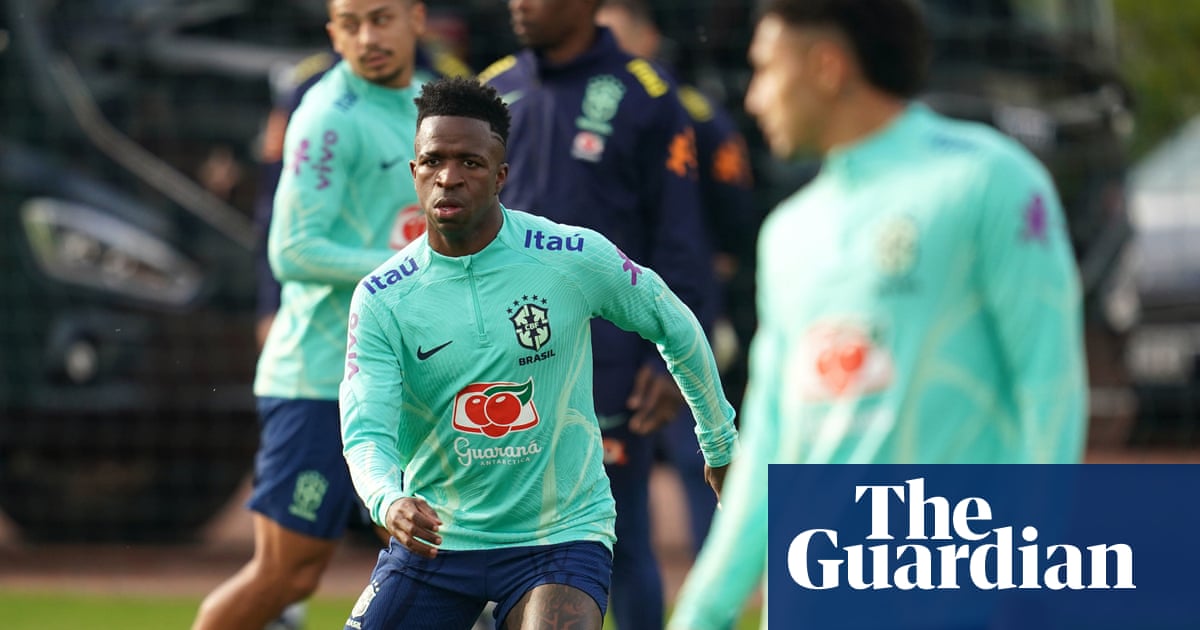
It’s carnival weekend in the Rhineland: a time of chaos and celebration, a world of masks and costumes, a time for expressing who you are and discovering who you can be. Certainly there will be plenty of fancy dress on display at the BayArena on Saturday when Bayer Leverkusen take on Bayern Munich in the biggest game of this Bundesliga season: first versus second, the challengers against the champions, the coming force against the establishment. Who are the real contenders? And who is simply wearing the costume?
For Xabi Alonso and his Leverkusen side, this entire campaign has, in a way, been a brilliant exercise in self-deception. It was around the turn of the century when they lost a Champions League final and finished Bundesliga runners-up four seasons in six, that the “Vizekusen” tag (Vize meaning “vice” or “second”) began to stick. They have never won the title. And yet here they are: top of the table, the last unbeaten club in Europe’s big five leagues, able to go five points clear if they can beat Thomas Tuchel’s Bayern.
And though the two clubs are separated by only a couple of points, the real distinction here is in mindset and opportunity. Bayern have won the past 11 Bundesliga titles, they’re contenders this season, they’ll be contenders next season and the season after that. For Leverkusen, there are no such guarantees. The same market forces that swept away Kai Havertz and Moussa Diaby in recent years may well sweep away Alonso too this summer. And so, if there is a faint sense of unreality at just how good they have been this season, it is inflected with a certain fragility too. This, right here, is it. Their golden chance could well be their last chance.
Perhaps this has contributed to the unusual focus and cohesion around the Leverkusen squad, a group of players utterly determined to live in the present. No rehearsals, no second chances. “It’s a long time since I saw a team this fast, this aggressive, this good tactically, this confident on the ball,” wrote the former Leverkusen manager Klaus Toppmöller in his Kicker column this week. “Everything is perfectly prepared, offensively and defensively.”
At which point it is probably worth trying to explain what, exactly, Alonso – perhaps the most celebrated young coach in Europe – is doing there. Because it’s not always easy to discern. His Leverkusen are a complex, shape-shifting bunch: a back three that often defends as a four, players rotating positions, a team equally comfortable on the blitz attack or in long spells of patient possession. And of course Alonso himself could basically be an AI-generated aggregator of the finest coaching influences in the modern game: Pep Guardiola, José Mourinho, Carlo Ancelotti, Rafa Benítez, Vicente del Bosque, all of whom he played under at various stages of his career.
But of course there are some non-negotiables there: technical ability, flexibility, high wing-backs. There are parallels with Roberto De Zerbi’s Brighton in the way they try to draw the opposition in before spreading the play elsewhere. Granit Xhaka, signed from Arsenal in the summer, has been a revelation in the centre, playing more progressive passes than any other player in Europe. Alongside him, Exequiel Palacios is second in the Bundesliga for dribble success rate. Ahead of them Florian Wirtz and Adam Hlozek have the licence to direct play as they see fit, creating a deadly triangle with the top scorer, Victor Boniface.
The response in Bavaria, meanwhile, has been a mixture of indignation and defiance. “Two points, that’s not a gap,” Tuchel scoffed this week, but he will know better than anyone that this is a game with the potential to make or break his Bayern career. He will know, too, that the comparisons with Alonso are not meant to flatter him. He had very little playing career to speak of. His personal style has often been characterised as a little brusque and aloof. There have been the usual rumblings about dressing room discontent, a slightly reactive style of football (possession is down a little compared with the past couple of seasons), an overreliance on the goals of Harry Kane.
But for all the justified criticism out there, it’s possible to argue that Tuchel is still doing a better job, with more limited resources and against a better opponent, than his predecessor, Julian Nagelsmann. Injuries, particularly in defence, have bitten hard and led to the hasty signing of Eric Dier in January. Even now, he is without Alphonso Davies, Kingsley Coman and Serge Gnabry, with Joshua Kimmich still feeling his way back from injury and Manuel Neuer a doubt.
For all this, Bayern are seven points better off than Nagelsmann’s side were at the same point last season. Leverkusen, disrupted by international call-ups and injuries of their own, have struggled in recent weeks to match the irresistible fluency they showed before Christmas. The absence of Boniface until April is a big loss for them. And it remains to be seen whether the crescendo of speculation over Alonso’s future – with Liverpool, Real Madrid and even Bayern themselves potentially looking for a new manager in the summer – will disrupt the finely oiled machine running on a cocktail of pure vibes and exquisite harmony.
Experience warns us what to expect. Bayern will always be held to a higher standard because in large part they have managed to reach it. They don the costume of champions, and it becomes them. It fits. This is the institutional memory that has allowed them to beat off all contenders for the past 11 seasons. For Leverkusen, by contrast, history is not a comfort but an obstacle to be conquered, a mask to be shed.
Saturday’s game will not decide the title. But it may just tell us if these two clubs are still who they think they are.












